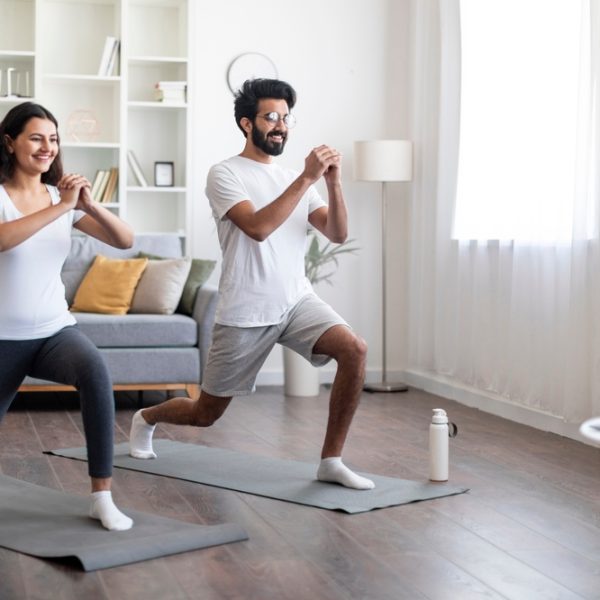It’s that time of the year again. The time we all make ‘new year, new me’ resolutions about getting fitter, eating healthier and leading a more balanced life. The problem is, many of us find it difficult to sustain the habit and most new year resolutions are dropped by March. Even if you’re already on the fitness wagon, it can be difficult to regain the motivation to start your routine after a few relaxed weeks of end-of-year festivities. We spoke to some of our expert instructors and here’s their advice on how to build an exercise habit for 2024:
Make your goals SMART
When making our new year resolutions, we often tend to think in abstracts. Making goals sound like ‘I’m going to lose weight’ or ‘I will become fitter’ is setting us up for failure since we don’t have any measure of success. Studies have shown that the more concrete the goals are - broken down to micro-steps - the more likely you are to stick to them. Experts suggest making your exercise goals as SMART as possible - that is, Specific, Measurable, Attainable, Relevant and Time-bound. So, instead of saying ‘I will become fitter’, a SMART-er goal would be to say ‘I will lose 5 kgs by March.’
It’s also important to remember that our brain loves success - so make sure your goal is attainable. If you’re just starting out, instead of setting a goal of going to yoga class five times a week, set yourself up for success by keeping your goal to three days a week. If you have trouble sticking to your exercise routine, try a bootcamp which will give you specific outcomes within a given time period, which might motivate you to keep exercising throughout the year.
Avoid the ‘all or nothing’ trap
All or nothing is a common cognitive distortion that we fall into. It’s the trap of not going to the gym for a week and thinking ‘I always do this. I should give up’ or not seeing the results we hoped for even after weeks of exercising and thinking ‘this never works. What’s the point?’ We often fall into the two binaries of all or nothing, when actually progress trumps perfection, especially when you’re trying to build an exercise habit. Instead, accept that you’re going to have good days and bad days - and that’s okay. The trick is to reframe your thoughts: instead of thinking, ‘this is never going to work’ try ‘this hasn’t worked yet’; instead of ‘I only have half an hour to exercise today, there’s no point working out today,’ try thinking, ‘Half an hour exercise is better than no exercise at all, and I can do my usual hour tomorrow.’
Try Temptation Bundling
Another easy way to try and trick your brain into building an exercise habit is through ‘temptation bundling’. Coined by Wharton behavioral economist Katherine Milkman, it is theto tie together things that your brain views as rewards - things that give you pleasure - with the things you view as a chore or can’t see the immediate benefits of - like exercising. Experts say that it can lead to great results while trying to build a habit. For example, if you really like watching TV shows, you can try to bundle that temptation with time at the gym. That way you can look forward to catching up on your show while you’re on the treadmill at the gym, making it more likely that you will consistently turn up. Or, if you love listening to music or a podcast, you turn that on only while attending your yoga sessions which, again, helps you build a habit. It will be easier to get started and, once you’ve become consistent, easier to let go of the need to reward yourself.
Make it easy
We often fall behind on our fitness goals because we expect too much of ourselves. Instead, when you’re trying to build a habit, make it as easy as possible to do. For example, if you have trouble waking up early, you might find it difficult to wake up early and hit the gym before you go to work. Instead, experts suggest, make the behavior easy by signing up for an online class, so that you can do it from the comfort of your home. If you have trouble getting back from work and heading out to the gym because you’re too comfortable on the couch, try packing your gym clothes and going straight from work.
Keep your exercising gear out and visible (some people have even had luck wearing it to bed!), prepare your pre-workout meal, and give yourself as few excuses as possible to not take the action. Making your behavior as easy as possible is the first step towards achieving it.
Get support
Research has found that working collaboratively often leads to better results and more accountability than doing things in isolation. Find yourself an exercise partner, join a yoga group, or a community of people who are also interested in the same forms of exercise you find fun. Having a partner to keep you consistent and make exercising more fun can go a long way in building an exercise habit.
Looking for a health buddy in 2024? Check out our Health and Wellness Whatsapp Community.
Read more

























